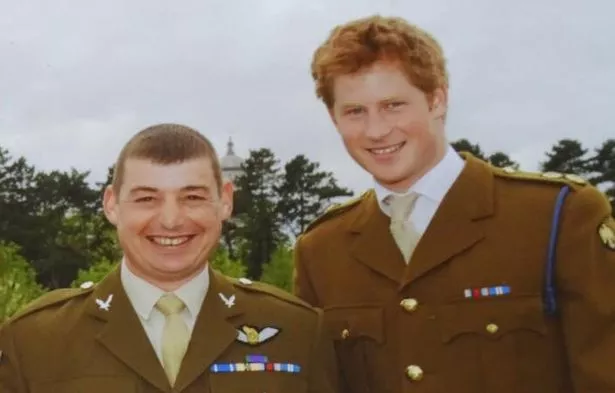By Sheila Mckenzie-
Press regulator IPSO, has ruled against Sergeant Major Michael Booley- Prince Harry’s former army instructor- over a series of complaints concerning the accuracy of a Sunday Mirror article.
The article in the Sunday paper had claimed that Booley(pictured left, next to Harry) described parts of Prince Harry’s autobiography, “Spare,” as a “complete fantasy.”
The article reported on comments the complainant had made regarding his experience accompanying the Duke of Sussex on a flight training exercise, which the Duke had subsequently described in his autobiography.
The story opened by stating: “Prince Harry’s dramatic account of a ‘suicide’ training flight is a fantasy – says the man who was sitting alongside him [the complainant]”.
Booley’s objections centered around the headline, asserting that the article mischaracterized his statements and attributed inaccuracies to Prince Harry rather than the ghostwriter.
The complainant also told IPSO that the article wrongly suggested he blamed the alleged inaccuracies on Prince Harry, when he had put them down to the book’s ghostwriter. He added that he said he had an extensive conversation via messaging app with the journalist who had then “cherry-picked” quotes in a misleading way – although the reporter had shared the quotes he intended to use in advance.
Booly also complained that he had asked Ipso to send him a copy of the planned article before it was published, but said The Sunday Mirror refused.
Editors are not obliged to show individuals copies of articles in advance of their publication, but many members of the public often prefer to see copies of planned articles in advance, mainly to confirm the accuracy of its content.
However, showing copies of articles before they go live can also create the issue of the writer being confronted about how they are telling their story.
IPSO concluded that the headline in this case was not inaccurate, misleading, or unsupported by the article’s content.
The Sunday Mirror headline initially read, “Flight of fantasy,” later amended to “Prince Harry’s army instructor says Spare story was ‘dramatised for effect.’; Booley contended that the article falsely implied he blamed Prince Harry for inaccuracies, while he had actually attributed them to the book’s ghostwriter.
IPSO’s complaints committee highlighted that single quote marks might signify paraphrasing or the publication’s interpretation, but in this case, it deemed the attribution of “fantasy” to Booley as clear.
The committee determined that the article’s detailed exploration of Booley’s objections to events recounted in the book justified the headline’s summary of his views.
Ipso said the “thrust” of his “position – that the depiction of events as set out in the autobiography differed in several key respects from what had actually happened – was not substantively different from the headline’s summary of his views”.
While the Mirror had issued a correction and apology, acknowledging that Booley never used the phrase “complete fantasy,” IPSO’s ruling clarified that the article, in essence, captured the thrust of Booley’s position.
Booley had raised objections on Facebook, expressing disappointment and feeling betrayed by the newspaper.
The same idea applied for the claim that he felt the book was “dramatised ‘for effect’”
The ruling, while clearing the Sunday Mirror of breaches of accuracy standards, raises questions about the delicate balance between accurately portraying interviewees’ perspectives and potential nuances in interpreting their statements.
The controversy highlights the challenges in reporting on sensitive matters, particularly those involving public figures like Prince Harry.




